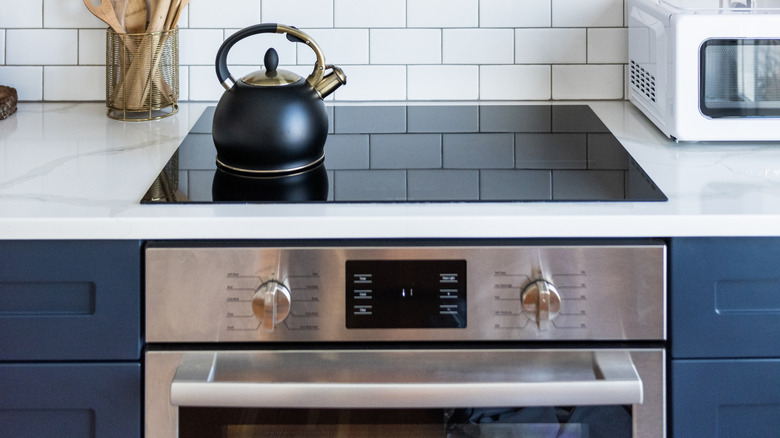The Everyday Kitchen Appliance The Property Brothers Refuse To Buy (What They Prefer Instead)
The two siblings who host "Property Brothers," Drew and Jonathan Scott, avoid installing gas ranges in their renovation projects. Instead, the brothers consistently opt for induction cooktops, which are often cited as better than gas. Fans of the show may have noticed this and assumed it was a decision made to modernize the kitchen. This is somewhat true — but the choice is also based on a mix of practicality, safety, and shifting design trends.
In the modern-day kitchen, induction cooking has become the new standard. For those who are not familiar on how these appliances function, induction cooktops use electromagnetic energy to directly heat pots and pans. The benefit? Faster cooking times and more precise temperature control than gas stovetops. This makes them especially appealing for upgraded home cooking; plus, the Property Brothers often design dream kitchens and induction stovetops look more sleek than the older gas stovetops. It also helps that induction appliances fit neatly into the Property Brothers' design philosophy of minimal clutter and a polished, high-end look, as they can blend almost seamlessly into a countertop, which is harder to achieve with bulky gas ranges.
Safety is another obvious benefit. Gas stoves have open flames, which, of course, come with fire risks, and they unfortunately produce unhealthy indoor air pollutants, such as nitrogen dioxide. A study in the International Journal of Environmental Health and Research found that gas cooking increased risks of asthma in children and other respiratory issues. Induction, on the other hand, produces no emissions in the home and stays cool to the touch outside of the pan area, making it a safer choice for families with kids.
Why the Property Brothers will continue to buy induction stovetops
The Property Brothers' preference for induction is also a part of a broader regulatory shift happening in the United States. New York state became the first state to ban gas stoves in new buildings, and other states and some cities are considering a similar phasing out with new construction. Not all have gotten behind the proposal — for example, California has reversed the proposed gas ban.
As these regulations expand across the country, induction cooking is becoming not just a design choice, but a practical necessity for safer and more sustainable kitchens. It can also support long-term home value, as buyers want homes that won't need major appliance overhauls in a few years due to policy changes or a desire for modern appliances. By avoiding gas appliances, The Property Brothers are essentially future-proofing their renovations. Plus, these appliances help save you money in the long run; according to the U.S. Department of Energy, induction stovetops are up to three times more efficient than gas.
But there's also the flipside — a few strong arguments exist for why some would want to keep a gas appliance. For starters, gas stoves and ovens are often used in chef kitchens and restaurants. As an industry standard, many people are simply accustomed to cooking with an actual flame. They also offer functionality during power outages, as they can be manually lit, while induction cannot. While induction stoves generally save money over time, know that these appliances will cost more upfront, which can cause some resistance when committing to buying one. These benefits and nostalgia for gas cooking are understandable; the Property Brothers are betting on a future where induction appliances are the majority.

